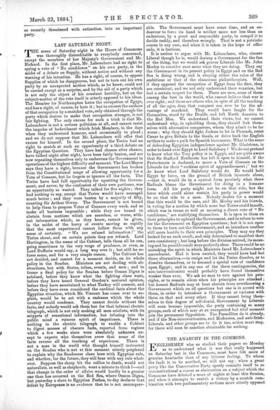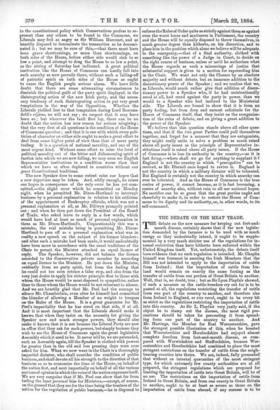THE ANARCHY IN THE COMMONS.
ENGLISHMEN who so studied their papers on Monday as to understand what it was that really happened on Saturday last in the Commons, must have felt more of genuine heartache than of any bitterer feeling. To whom the fault is to be ascribed, we will not say ; when a great party like the Conservative Party openly commits itself to so unconstitutional a course as obstruction on a subject which the Commons have debated a score of nights at least this Session, and when it attempts to snatch a victory by a scratch com- bination with two parliamentary sections more utterly opposed to the constitutional policy which Conservatives profess to re- present than any others to be found in the Commons, we Liberals may feel as angry as Sir William Harcourt, and as heartily disposed to denominate the transaction as he denomi- nated it ; but we may be sure of this,—that there must have been grave shortcomings, or more than shortcomings, on both sides of the House,-before either side would sink to so low-a point, and attempt to drag the House to so low a point, as the sitting of Saturday last indicated. A great political institution like the House of Commons can hardly fall into such anarchy as now prevails there, without such a falling-off of patriotic spirit on both sides of the House as ought to cause the English people serious alarm. We have little doubt that there are some attenuating circumstances to diminish the political guilt of the party spirit displayed, in the disintegrating action of the new Irish party, and the neces- sary tendency of such disintegrating action to put very great temptations in the way of the Opposition. Whether the Liberals yielded first to that temptation during Lord Beacons- field's regime, we will not say ; we suspect that it may have been so ; but wherever the fault first lay, there can be no doubt that the nation has now reason for serious misgiving ; that the very first of all questions is the condition of the House of-Commons question ; and that it is one with which every poli- tician of character on either side ought to make a great effort to deal from some higher point of view than that of mere party feeling. It is a question of national morality, and one of the most urgent kind. Without some effort to raise the level of political morality out of the bitter and dishonouring spirit of faction into which we are now falling, we may soon see English Representative institutions in a condition worse than that which we have so often deplored in countries without our great Constitutional traditions.
The new Speaker does to some extent raise our hopes that a new departure may be taken. And, oddly enough, he raises our hopes in consequence of the only error he has yet com- mitted,—the slight error which he committed on Monday night, when he permitted Mr. Dixon-Hartland to interrupt business by a personal explanation in relation to his criticism of- the appointment of Bankruptcy officials, which was not a personal explanation at all, as Mr. Dillwyn promptly pointed out ; and when he then put down the President of the Board of Trade, who asked leave to reply in a few words, which would have had at least as much of personal explanation in them as Mr. Dixon-Hartland's. Unquestionably this was a mistake, the real mistake being in permitting Mr. Dixon- Hartland to pass off as a personal explanation what was in reality a new speech on the subject of his former blunders ; and after such a mistake had been made, it would undoubtedly have been more in accordance with the usual traditions of the Cthair to permit the Minister attacked an equal licence of reply. The Speaker, however, did not balance the licence accorded to the Conservative private member by according an equal licence to the Minister. He put down the Minister, evidently from no party spirit, but from the feeling that he could not too soon retrace a false step, and also from the very just desire to apply his stricter principle first to those with whom the House would be most disposed to sympathise, rather than-to those whom the House would be not reluctant to silence. And we are heartily glad that Mr. Peel had the courage to silence Mr. Chamberlain, even after he himself had committed the blander of allowing a Member of no weight to trespass on-the Rules of the House. It is a great guarantee for Mr. Peel's impartiality that he has erred on that side, if at all. And- it is most important that the Liberals should make it known that when they insist on the necessity for giving the Speaker new and much stronger powers, they should also make it known that it is not because the Liberal Party are now in office that they ask for such powers, but simply because they wish to see the House of Commons again the great legislative Assembly which it used to be. It never willbe, we are persuaded, such an Assembly again, till the Speaker is clothed with powers far greater than in the old and less pressing days were ever asked for him. What we now want in the ()hair is a thoroughly impartial dictator-, who shall consider the condition of public business, and shall devote all his strength to the direction of that business so as to economise the time of the House, on behalf of the nation first, and next impartially on behalf of all the various sections of opinion in which the voice of the nation expresses itself. We are very sanguine that if Mr. Peel can show that far from feeling the least personal bias for Ministers,—except, of course, on the ground that they are for the time being the trustees of the nation for the regulation of public business,—he is disposed to enforce the Rules of Order quite as strictly against them as against even the worst bores and mutineers in Parliament, the country and the House will be equally disposed to throw themselves, in much greater degree than hitherto, on his discretion, and to place him in the position which alone we believe will be adequate to the emergency,—that of a final authority, clothed with something like the power of a Judge in Court, to decide on the right course of business, unless or until he authorises what the House regards as such a miscarriage of justice that substantial support is given to a motion for superseding him in the Chair. We want not only the Closure by an absolute majority and without debate, but an immense addition to the discretionary power of the Speaker ; and we confess that we, as Liberals, would much rather give that addition of discre- tionary power to a Speaker who, if he had unintentionally erred at all, had erred against the party in power, than we would to a Speaker who had inclined to the Ministerial side. The Liberals are bound to show that it is from no party feeling, but from deep and earnest solicitude for the House of Commons itself, that they insist on the reorganisa- tion of the rules of debate, and on giving a great addition to the power of the Speaker.
We believe that this question stands above all other ques- tions, and that if the two great Parties could pull themselves together, and forget for a moment that they are antagonists, they might really unite to solve a problem as much raised above all party issues as the principle of Representative in- stitutions itself is raised above all party issues. If the House of Commons is to lose its authority in the country,—as it is fast doing,—where shall we go for anything to supplant it I England is not the country in which " prerogative ' can be revived, as Mr. Disraeli once hoped to revive it. England is not the country in which a military dictator will be tolerated. Bat England is certainly not the country in which anarchy can ever be tolerated. And as the House of Commons is the true centre of power, it cannot become, as it is fast becoming, a centre of anarchy also, without ruin to all our national hopes. No sacrifice can be so great that the great parties ought not cheerfully to make it, in order to restore the House of Com- mons to its dignity and its authority, or, in other words, to its self-command.



































 Previous page
Previous page